- Home
- Mike Lupica
The Underdogs Page 6
The Underdogs Read online
Page 6
At home games, Will would look up into the stands sometimes and it would be the same scene, over and over again:
Mr. Keenan at the top of the bleachers, by himself, yelling away. By the time they had played just a couple of games, most of the other parents wouldn’t go near him. And any adult showing up for the first time wouldn’t stay near him for long.
He never swore, not that Will heard. He didn’t make negative comments about the other players, on either team. Never complained about the officiating.
It was all directed at Toby.
Telling him to pay attention. To know where the ball was. To be aware of whatever formation the other team was running. Telling all this to a fifth-grade middle linebacker.
“Don’t be a bonehead and go for that fake, you jack wagon. How about hitting somebody, or do you still think you’re playing flag football?”
Every so often, maybe once or twice a game, he would offer his son what passed for a compliment with him:
“That’s better.”
About halfway through the season their coach that year, Mr. Mallozzi, asked Toby’s dad if he could possibly dial it down a little. This was after a game, in the parking lot, and the whole team heard and saw what happened next, Mr. Keenan almost challenging Mr. Mallozzi to a fight.
It ended with Mr. Keenan saying, “I don’t tell you how to coach, don’t tell me how to father.”
So nothing changed until the last game, what was called their Super Bowl. Late in the game, a game Forbes was winning by twenty points, Toby missed a tackle on the other team’s tight end and the kid went sixty-five yards for a touchdown that only made the final score a little closer than it should have been.
For some reason, it made Mr. Keenan’s head explode one more time that afternoon.
As soon as the tight end was across the goal line, this is what everybody at Shea Field heard:
“Toby Keenan, if you’re not gonna play to the end of the game, why are you still out there?”
There was a pause and then:
“Why don’t you just quit playing now?”
That’s exactly what Toby Keenan did.
He walked off the field before the kickoff. Took off his helmet when he got to the sideline, took off his jersey, put both at the end of the Forbes bench. Then he walked past the bleachers, his dad at his usual spot near the top, kept walking toward the parking lot.
And as far as Will knew, Toby walked all the way home, to the house on the dirt road that was the end of Spencer Street. He had never come out for football or played football, not even flag football, since.
Now Will was about to knock on his front door and ask him to come back.
The orange Department of Public Works truck was in the yard. Next to it was an old maroon Camry. It had to mean that Mr. Keenan was home. Will didn’t see as how that was going to help him out very much. He’d made the bike ride over here thinking he had a better chance of pulling this off—how many Hail Mary passes could you throw?—if it was just him and Toby alone.
Toby answered the door, and as soon as Will saw him, he was thinking that the only thing this boy had in common with Dick Keenan was size, because he had a much nicer face, with much darker hair, worn long.
Will had always thought there was a niceness about Toby at school, as shy and quiet as he was, as much as he kept to himself.
He must have gotten that from his mom. Briefly Will thought of all the things his own dad said Will had in common with his mom, the one who’d left him a lot differently than Toby’s had.
“Hey,” Toby said.
“Hey,” Will said.
Keeping his voice as low as possible, Toby said, “Listen, I know why you’re here.”
Will smiled. “He reads minds, too.”
Still standing there on the porch, Toby having made no move to invite him in.
It was then that Will heard the booming, familiar voice from somewhere behind Toby, like the voice was trying to rattle the walls of the tiny house, like the voice was still coming from the top of the bleachers.
“Who’s here?” Mr. Keenan yelled. “Is it that idiot cable guy finally showing up three hours after he was supposed to be here?”
Then Mr. Keenan was standing behind his son, in his white undershirt and baggy jeans, looking disappointed when he saw that their visitor was Will.
Nobody was very happy to see Will at 127 Spencer.
“I know you,” he said. “Joe Tyler’s kid. The halfback. You’re fast.”
“Nice to see you, Mr. Keenan.”
“Check him out, Tobes,” the dad said. “A pip-squeak half your size and still twice the player you are. Or were.”
“Dad,” Toby said.
A look on his face that Will remembered from when they still played together.
The big man put his small eyes on Will and said, “What do you want?”
To get as far away from here as possible, Will thought, as soon as I say to Toby what I came here to say.
“Just came to see Toby.”
“Never saw you here before.”
In the same soft voice he’d used when he greeted Will, eyes down like he was studying his sneakers, or Will’s, Toby said, “He’s my friend, Dad. He doesn’t need a reason to be here.”
They all just stood there until Mr. Keenan said to Toby, “Well, anyway, when the cable guy shows up, come get me even if I’m taking my nap, so I can give him a piece of my mind.”
Will found himself wondering how big a piece Toby’s dad could spare as the man grumped off toward the back of the house.
When he was gone, Toby said, “I’d ask you to come in. But you don’t want to.”
Will said, “Yeah.”
“It’s cool,” Toby said. “I’m used to it.”
They both knew what he was talking about.
“Yeah,” Will said again.
Toby said, “You should probably go, though. If he figures out why you came—at least why I’m pretty sure you came—it won’t be good.”
“I’m not here about him,” Will said. “I’m here about you.”
Now Toby’s voice was barely more than a whisper, the sound coming out of him more scared than anything else. “Will,” he said. “I wish I could. But I can’t.”
Will tried to look past him, saying, “Maybe you can’t.” It’s like we’re talking in code, he thought. “But what you can do is hear me out. Out here or inside, your call, but I gotta say what I came to say.”
Toby pointed and the two of them walked to the end of the driveway where the truck was parked and sat next to each other on the rear fender, almost like they were using the orange truck for cover.
“Listen, I’ll try to keep this short,” Will said. “I’m not here to blow smoke at you, but I’m not gonna lie, either. We need more players, like right now; practice is starting in a week. So I need you to play. But on top of that, I want you to play, too.”
“But I told you. I can’t.”
“Can’t or won’t?”
“Does it make a difference?”
Then he took a casual look over his shoulder, at the front door, the door still closed, Dick Keenan at a safe distance, at least for now.
“Dude,” Will said. “This season is going to be awesome. With you back in uniform, we can kick some serious butt. Shock the world!” He grinned. “Well, maybe not the world, just the West River league. But we can do this. Turn ourselves into one of those underdog teams. Heck, not just one of them. Make ourselves the underdogs. Do something that will make this town remember what it’s like to cheer.”
“You don’t need me to do that.”
“See, that’s just one more thing you’re wrong about. We do need you. Need your size, your speed. The way you play, adding you to the guys we already have, we can crush this, I totally mean it.”
Trying to talk himself into that, he knew, as much as Toby Keenan.
“You mean the way I played. Like, past tense.”
“I don’t know everything at our a
ge, but I know this: you don’t lose it between ten and twelve, dude. So you missed last season. Big deal. You’re a great player. Maybe the other guys didn’t see it. Maybe even the coaches didn’t. But I did. You’d barely figured out how to put on your own shoulder pads, and you were still one of the best guys we had.”
“It doesn’t matter.”
Will said, “Are you serious? It’s all that matters.”
Toby gave another quick look over his shoulder. “Will,” he said. “You love to play. I didn’t. I don’t. And probably never will.”
“Because you haven’t given yourself a chance.” Will nodded at the house. “Because he never gave you a chance.”
“It wasn’t all him. It was me, too. And I was never as good as you say I was.”
Will made a buzzer noise.
“Wrong again.”
Now Will checked the front door, lowered his own voice. “You’re listening to me, but you’re not hearing me. I saw what you were like in practice when he wasn’t around. I saw what it was like for you when he didn’t show up at an away game. You were one player when he was around and a totally different one when he wasn’t.”
Toby said, “You don’t understand.” Like his own words were hurting him. “If I come back, he comes back. Are you gonna tell me you want that?”
Will gave him a long look. “I would make that deal in a heartbeat,” he said. “Then come back an hour later and make it again.”
Then the words were just spilling out of him, Will telling Toby they would have beaten Castle Rock last season if he’d still been playing, still in the middle of the D. Telling him how much they needed him, not just because he would make a total of eleven players, because they needed his talent.
Needed somebody his size, because even though Will could imagine a team that was good and fast, they were going to get pushed around without at least one big guy the other team had to worry about.
“And not just big in size,” Will said. “But with a big heart. Like yours. Like the one I know you have to have just to . . . just to be.”
“It’s not what he says,” Toby said. “He talks about me like I’m the opposite, because I quit and wouldn’t go back. Said I wasn’t just heartless, that I was gutless.”
For the first time, Toby smiled. “Maybe my dad thinks he’s the only one with guts, because his gut is so gigantic.”
Toby Keenan looked down again, the smile off his face, out of him, that fast. “But why are we even talking about this?” he said. “It would just start up all over again.”
“Only if you let it. Only if you let him.”
“It’s like they say on TV. You can’t stop him, you can only hope to contain him.”
Then: “You don’t know what it’s like.”
Will said, “You’re right, I don’t. But I will make you a promise: you won’t just be getting a bunch of teammates who will have your back, you will be getting a bunch of friends. Starting with me.” Will kept going, feeling like he had his attention, like he might be getting through. Might be on a roll all of a sudden. “Get it through your head: you wouldn’t be doing this to prove anything to your dad. But maybe it would be about proving something to yourself. There’s a big player inside you, no matter what you’re telling yourself. Let him out.”
Will told Toby he didn’t need an answer today. And if he wanted, Will told him, he could come and watch the first couple of practices, no pressure, no worries, just to check it all out, just see what it felt like to be around the game again.
Toby said he’d think about it, that was the best he could do.
Before adding this: “But it’s still not gonna happen.”
“Give the idea a chance,” Will said. “All I’m asking.”
“Thanks,” Toby said.
“For what?”
Toby said, “Just thanks.”
They pounded each other some fist. Will walked down the driveway to where he’d left his bike. Before he got on, he turned and saw Toby Keenan walking slowly toward the house, as if it was the last place on earth he wanted to be.
Like he was walking off the field that day, walking away from football the way he did two years ago.
Will watched until he was through the front door, closing it behind him, Will feeling bad for him, for the life he had on the other side of that door.
He was still glad he’d come.
The big kid hadn’t said yes.
But he sure hadn’t said no.
CHAPTER 11
He briefly thought about going straight home then, calling it a day, calling Tim when he got there, maybe some of the other guys, trying to get up a game at Shea later. Then maybe go into town and get some ice cream at Scoop, a place Will knew had been in Forbes even before the sneaker factory.
“Homemade ice cream at Scoop when I was a boy, homemade now,” his dad often said. “At least Ben and Jerry and Baskin and Robbins didn’t wipe them out the way the big sneaker companies wiped out the Flyers.”
But Will convinced himself he might be on a little bit of a roll here. He’d left Toby’s house believing that the guy still wanted to play. That he did want to come back, whether his dad came along with him—at the top of his voice—or not.
So he decided he wasn’t going to wait for the perfect moment or wait until tomorrow, he was going to recruit himself a coach right now; it couldn’t be any harder than trying to get Toby turned around.
Getting Toby to listen when Will started talking to him from the heart.
On his way through town, Will did stop at Scoop after all, ordered himself a black-and-white shake because he’d brought just enough money for one with him.
He sat and drank it at the end of the counter, trying to rehearse his speech a little more, knowing he was probably only going to get one shot at this.
That meant, one shot to get it right. And maybe Tim was right, maybe he did think better if he wasn’t trying to do it on an empty stomach.
When he finished the shake, he got back on his bike, ready to roll in all ways. If Will Tyler knew one thing, it was this: he was pretty honest with himself. So maybe he was just being a dreamer all over again, about all of it, maybe Toby was only being polite, he had no intention of playing, he just wanted Will to leave. And leave him alone.
A definite possibility.
But Will always chose to believe in the best possibilities, even when he was down. There’d never been a time in football when he thought a play wasn’t going to work before the ball was snapped. Even last season, the championship game against Castle Rock, Will knowing that there really wasn’t enough time to come all the way back, he kept telling himself and his teammates that there was.
He’d waited behind Bobby Carrington and seen himself taking the handoff from him and breaking into the clear, going all the way, recovering the onside kick that would come next. Coming all the way back the way the Eagles did later in the same season against the Giants, that game right before Christmas when they were behind 31–10 with seven-and-a-half minutes left and then scored the last twenty-eight points, the last touchdown coming when DeSean Jackson—who had the kind of speed even Will only had in his dreams—took a punt return all the way to the house as time expired.
“As long as there’s still time,” DeSean Jackson said that day, “you can’t give up.”
So Will wasn’t even close to giving up yet, on the season or on Toby or getting the coach he wanted, the coach he knew would be perfect for his underdog team. What did his dad always say?
If you don’t think you can, you can’t.
Will rode his bike to the house and waited.
He was sitting there on his windowsill when he saw the guy he wanted to be his coach finally show up.
Saw Joe Tyler move slowly and painfully up the walk, limping more than usual today, worse than ever, limping so badly that he didn’t even try to fake it when he looked up and saw Will waving at him.
His dad had been at the gym.
Even after a week when he’d
mostly delivered the mail on foot, he still dragged himself to the gym on the weekends, sometimes both days, trying to gut his way through the exercises the physical therapist had given him. Somehow trying to make the knee stronger, build up the muscles around it, doing everything he could to stay away from something his doctor and the therapist had told him was probably inevitable:
Knee replacement surgery.
Joe Tyler fought that idea even harder than going back to a factory job.
“There are two words that would never go together with me,” he told Will. “Elective and surgery.”
“But I was with you when Dr. Friedman said that the operation would improve the quality of your life,” Will had said.
Even now he could remember the look his dad shot him when he said that, smiling, but his eyes sad. Will knew those sad eyes; he’d see them on his dad sometimes when he’d look at pictures of Will’s mom.
“Quality of life?” he’d said. “It would take more than a knee operation.”
Now he was stretched out on the couch, ice pack on the knee, Will having brought him a tall glass of lemonade, his dad doing what he always did when he got back from the gym, asking out loud, not really even talking to Will, why he bothered, he always felt worse when he got home, would probably feel even worse when he had to get up and do it again tomorrow.
And worse than that on Monday when it was time to get back to work.
“I wouldn’t even know what good felt like,” he said, “if good ever did come along.
“Maybe, in my next life,” he said to Will, “I’ll get to sit down once in a while during my workweek.”
He looked up at Will, standing over the couch, and said, “And what’s on your mind?”
“Nothing.”
“Sure there is. It’s written all over your face.” He winced when he shifted his position and moved the ice pack a little. “You’re a great son. Great ballplayer. Truly terrible liar.”
“Gee,” Will said, “I never heard that one before.”
“How about the one about people wearing their heart on their sleeve? That’s you right now.”

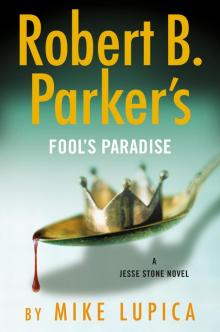 Fool's Paradise
Fool's Paradise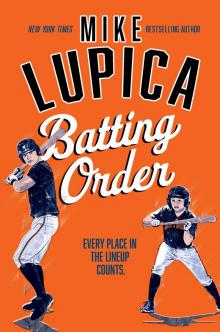 Batting Order
Batting Order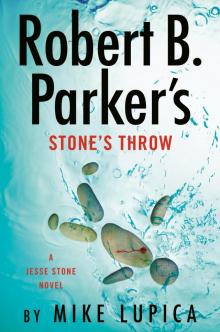 Stone's Throw
Stone's Throw The Lacrosse Mix-Up
The Lacrosse Mix-Up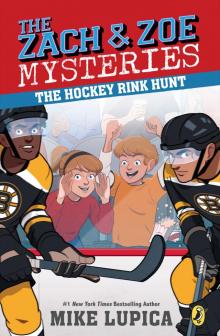 The Hockey Rink Hunt
The Hockey Rink Hunt Payback
Payback Triple Threat
Triple Threat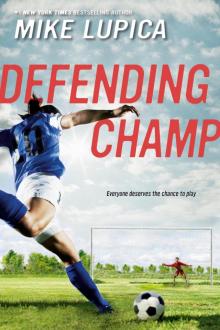 Defending Champ
Defending Champ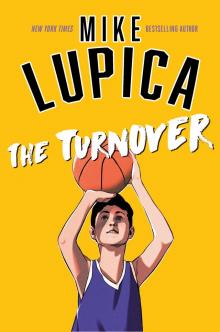 The Turnover
The Turnover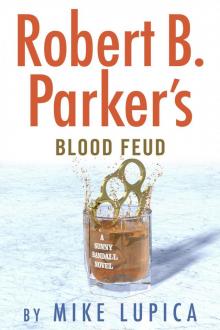 Robert B. Parker's Blood Feud
Robert B. Parker's Blood Feud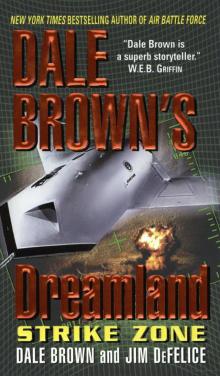 Strike Zone
Strike Zone Hero
Hero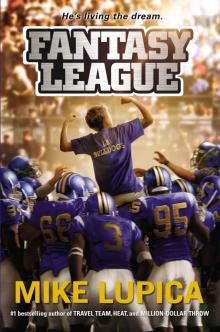 Fantasy League
Fantasy League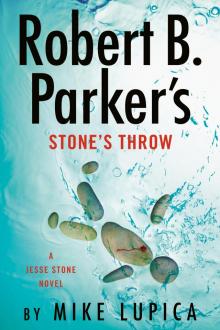 Robert B. Parker's Stone's Throw
Robert B. Parker's Stone's Throw The Big Field
The Big Field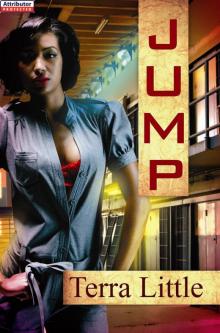 Jump
Jump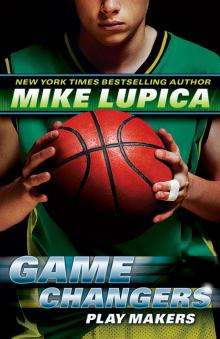 Play Makers
Play Makers The Underdogs
The Underdogs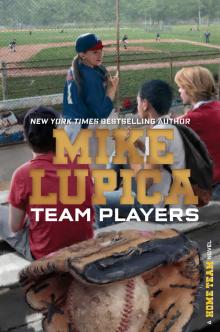 Team Players
Team Players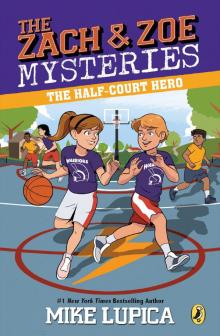 The Half-Court Hero
The Half-Court Hero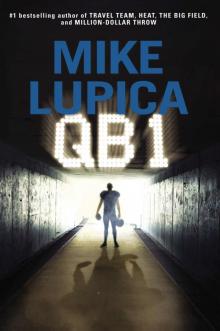 QB 1
QB 1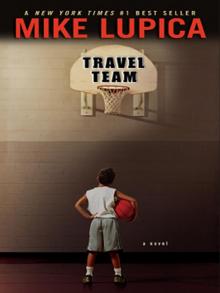 Travel Team
Travel Team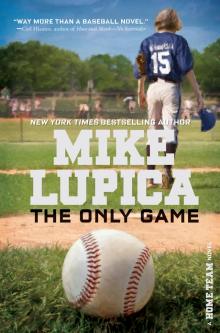 The Only Game
The Only Game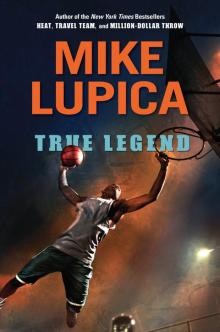 True Legend
True Legend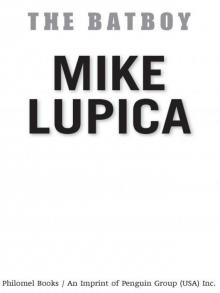 The Batboy
The Batboy Hot Hand
Hot Hand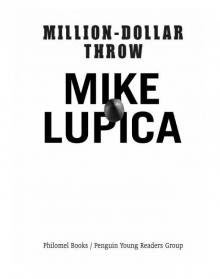 Million-Dollar Throw
Million-Dollar Throw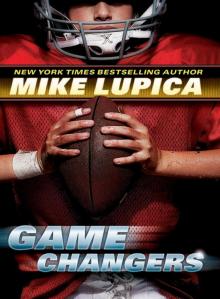 Game Changers
Game Changers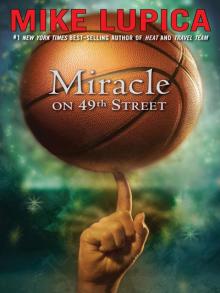 Miracle on 49th Street
Miracle on 49th Street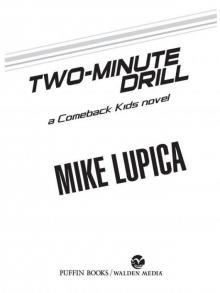 Two-Minute Drill
Two-Minute Drill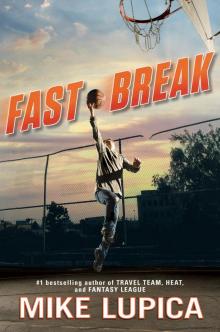 Fast Break
Fast Break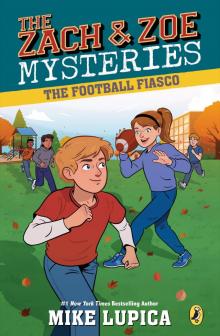 The Football Fiasco
The Football Fiasco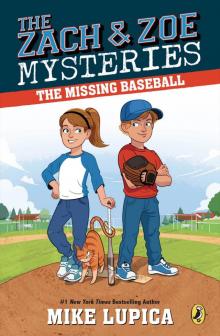 The Missing Baseball
The Missing Baseball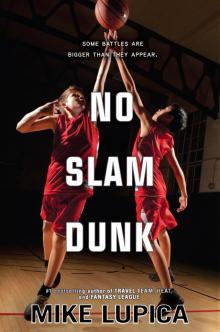 No Slam Dunk
No Slam Dunk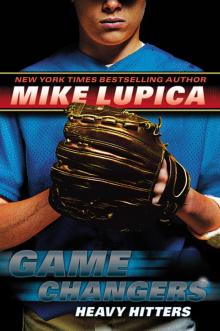 Heavy Hitters
Heavy Hitters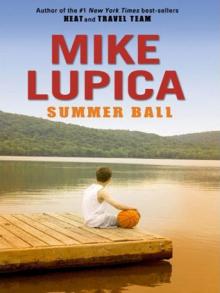 Summer Ball
Summer Ball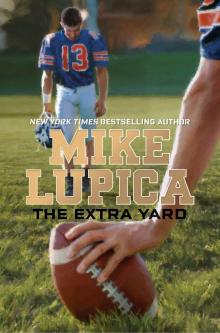 The Extra Yard
The Extra Yard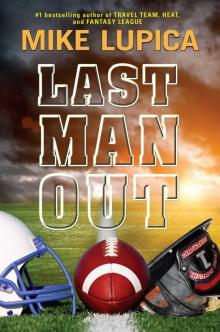 Last Man Out
Last Man Out